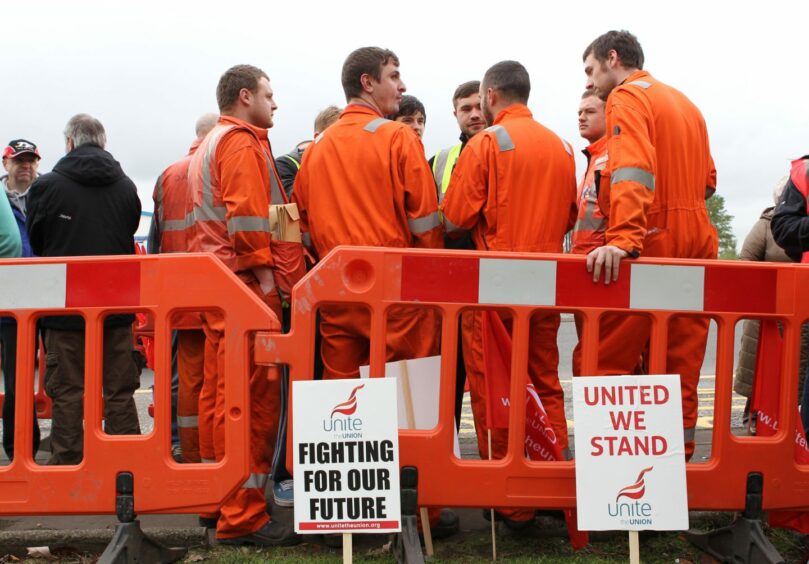
Spiralling living costs coupled with record profits for energy producers have fuelled a series of increasingly bitter disputes between operators and workers throughout 2022.
Unions and workers have increasingly opted to pursue strike action as they seek pay deals in line with UK inflation rates in excess of 11%, and made clear their intentions to fight back against proposed changes to policies on items like overtime and benefits.
Meanwhile, contractors and trade bodies have bemoaned workers’ rejection of often “unprecedented” pay deals and pointed to existing collective bargain agreements – such as the Energy Services Agreement (ESA) – as margins are ground down by rising supply chain costs.
As it stands, several deals have already been reached between unions and industry reps in the wake of strike ballots and several major actions.
Yet employment experts have already warned the possibility of action is likely to persist, both in the energy sector and across the UK economy. Indeed, another round of work stoppages are already slated to begin this week if resolutions cannot be found.
Energy Voice has prepared a primer on those held so far, and those still to be carried out.
Wildcat action
Perhaps the most serious action came in the form of two major wildcat strikes initiated by offshore workers in May and September.
During the former, workers on installations for some of the sector’s largest operators, including BP’s ETAP and Harbour Energy’s Judy, downed tools in an effort to force an increase to pay, in what was described by some participants as a “wage revolution”.
In the wake of the action, contractor Bilfinger signed up to the ESA – though the terms of the agreement remain a major sticking point amongst workers – and engaged with workers over a series of formal grievances.
However, hundreds of workers launched a further 24-hour unofficial action in September across more than a dozen North Sea assets with similar demands, despite warnings by employers and unions that unlawful action “risks everything.”
Further negotiations over the terms of the ESA are ongoing. However, missives seen by Energy Voice in November indicate there remains considerable disagreement over what an “acceptable deal” might look like – with further official action a distinct possibility.

Drilling and catering
North Sea drilling crews also rejected a proposed 5% pay offer and voted to down tools in October as union Unite served notice to trade body the United Kingdom Drilling Contractors Association (UKDCA).
Following the first in a series of planned 48-hour work stoppages, around 450 workers accepted a 10% increase in their rates of pay backdated to 1 June 2022, bringing further strikes to an end.
The victory was hailed by the union as “what can be achieved when meaningful negotiations take place.”
The union welcomed a similar victory for offshore catering staff in November, after members rejected a 7% pay offer subsequently increased to a deal worth 10% on basic salaries, ending another long-running dispute.
A majority of the group’s membership accepted a revised offer made by the Catering Offshore Trade Association (COTA), which represents seven companies supplying services to offshore oil and gas rigs in the North Sea, avoiding escalation to full industrial action.
Alongside a 10% pay bump, the deal includes a backdated payment of around £1,000 for lower pay grades, to be made in December.
Unite said the deal covers over 3,000 workers including chefs, bakers, stewards and administrative team members employed by service companies like Aramark, Conntrak, Entier, ESS, FOSS & ESG, and Sodexo.
Similar action proposed by around a dozen North Sea medics stationed on Shell assets was cancelled after an improved pay offer was tabled by their employer UnitedHealthcare Global.
Mossmorran
Discontent has not been limited to offshore staff, with petrochemical and terminals across Scotland also potentially affected.
Unite said around 200 of its members based at US supermajor’s ExxonMobil’s (NYSE: XOM) ethylene plant in Mossmorran, Fife, would vote in November over whether or not to conduct their own action, in a dispute centres on over bonus payments as made under the National Agreement for the Engineering Construction Industry (NAECI).
The action covers contractors at the site employed by Altrad, Bilfinger, and Kaefer.
And in October, Unite balloted more than 100 Kaefer contractors based at the Shell-operated (LON:SHEL) portion of the Mossmorran site and the St Fergus gas plants, after they rejected a pay offer of between 5-7% depending on job grade, which the union said would amount to a “real terms pay cut” for members.
Petrofac
More recently, two separate actions have been proposed or carried out by Petrofac workers stationed on various North Sea assets, as Unite members battle over pay, conditions and rota patterns.
146 members working for Petrofac on Repsol Sinopec UK assets voted to enact a continuous overtime ban and a 48-hour work stoppage on 16 November, after workers’ rejected a 3% pay offer and sought the reinstatement of a 10% equal time payment, alongside other benefits.
Participants spanning a range of trades from mechanics and electricians to safety technicians, pipe fitters and deck crew took part, with further strikes mooted for December 8 and 9.
Meanwhile, 76 Petrofac workers on BP assets including Andrew, Clair, Clair Ridge and ETAP installations recently voted to strike after a ballot returned 98.3% in favour of industrial action.
This dispute centres on workers having to continue a three week on, three week off (3/3) rotation offshore, which has been described as “hated” by the workforce.
Unite has also claimed that workers were forced to waive an increase in wages associated with longer working hours when the rota pattern was implemented in 2015.
A Petrofac spokesperson said: “We are committed to ensuring leave time provides adequate rest and recuperation for our offshore workers and believe we can bring this dispute to a prompt conclusion.”
A date for the strike action has not yet been set.
National strike mooted?
The extent of action on and offshore paints a stormy picture for the energy sector in the coming months, and the success of some workers in achieving pay deals is only likely to embolden those awaiting further ballots.
In a recent interview Jake Molloy of the RMT said poor pay and conditions – and the 3/3 rota patterns in particular – had led to a “a great deal of frustration and anger” amongst workers, particularly when oil producers have continued to post eye-watering profits.
“The intransigence of the oil companies means it looks ever more likely we’re looking at a national strike across all of the sector,” he warned.
As energy prices continue to rise, and with inflation not expected to slow until 2023, it would appear that the stage for such an event is well and truly set.
Recommended for you

